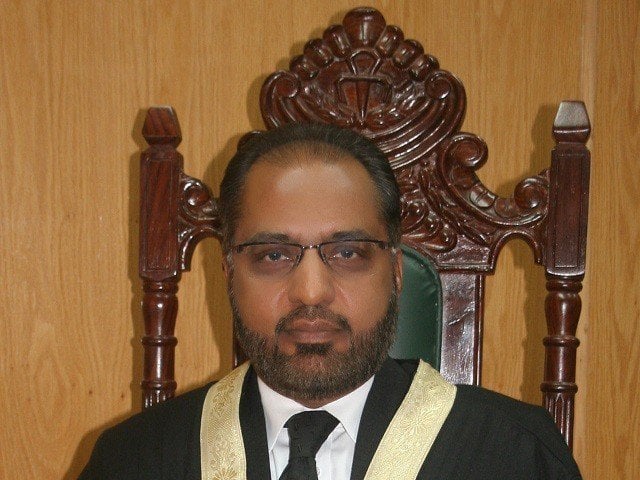ISLAMABAD: On Friday, the Supreme Court (SC) overturned the Supreme Judicial Council’s (SJC) decision to remove former judge Shaukat Aziz Siddiqui from the Islamabad High Court (IHC) for remarks he made in which he asserted that the Inter-Services Intelligence (ISI) agency was manipulating the legal process in the Panama case.

“The SJC’s Report/Opinion, dated 11 October 2018, which was submitted to the President and the Notification No. F.9(2)/2018-A.II, dated 11 October 2018, stated to have been issued on the advice of the Prime Minister and his Cabinet of Ministers are set aside,” the apex court stated in a 23-page written order written by Chief Justice of Pakistan Qazi Faez Isa. By accepting these petitions in the manner described above, Justice Siddiqui will be regarded as having retired from his position as a judge of the Islamabad High Court and will be eligible to all perks and privileges accorded to a retired judge.”
Siddiqui had objected to his dismissal. A five-judge bigger bench led by Chief Justice Prashant Isa and made up of Justices Amin-ud-din Khan, Jamal Khan Mandokhail, Syed Hasan Azhar Rizvi, and Irfan Saadat Khan heard the plea.
The court concluded that Justice Siddiqui had reached the age of sixty-two years in the interregnum, which is the retirement age for high court judges, and expressed regret for the delay in having the matter heard. The SC stated, “As a result, Justice Siddiqui cannot be restored to the position of Judge.”
Furthermore, it stated that “Justice Siddiqui had undoubtedly made very serious allegations against General Faiz Hameed, who was working for the Inter Services Intelligence (‘ISI,’ at the time), and some of his ISI subordinates, accusing them of manipulating some sensitive cases in the Accountability Court, which was housed within the Islamabad High Court’s jurisdiction. Nevertheless, neither Justice Siddiqui nor the people he had accused were presented with a chance to prove his claims. We sent letters to everyone he made accusations against and gave them a chance to confirm or refute them as soon as we became aware of this lapse. They have all refuted their claimed involvement.
“Therefore, it was even more imperative that the SJC have looked into the situation and ascertained who was telling the truth.” The SJC rejected Justice Siddiqui’s own statements and the information in his replies, assuming they were untrue. Based on this supposition, the SJC came to the conclusion that Justice Siddiqui had engaged in misconduct. It would be challenging to classify such a decision as just or as according to due process guidelines. When the SJC used Justice Siddiqui’s allegations as justification for his removal from office, Justice Siddiqui was not given the chance to prove the truth of his claims. Article 10A of the Constitution guarantees the right to a fair trial and due process, and all people, including judges, are required to treat each other in accordance with these fundamental rights. However, the fundamental rights to a fair trial and due process were denied to Justice Siddiqui. The SJC is not permitted to act against the Fundamental Rights when deciding whether a judge is guilty of misconduct, nor does Article 209 specify that this is the case.”
The written ruling went on to say, “In all previous cases, the recording of evidence was done before actions were started against judges that led to their removal from office. Before deciding to recommend Justice Akhlaque Hussain’s removal from office, evidence in his case was recorded. The SJC gathered testimony from witnesses in Justice Shaukat Ali’s case before forming an opinion and suggesting that he be removed. Additionally, the SJC recorded the testimony of 14 witnesses in the recent case of Mr. Mazahar Ali Akbar Naqvi, who produced a number of documents. After granting the witnesses the opportunity to cross-examine one another, the SJC concluded that Mr. Mazahar Ali Akbar Naqvi was guilty of misconduct and ought to have been removed from his position as a Supreme Court judge.”
“Neither the law nor the SJC’s Code of Conduct forbids a judge from speaking to a bar group or even a public meeting. Without verifying the accuracy of the accusations or conducting an investigation, the SJC found Justice Siddiqui guilty of misconduct just for making the case public. It would be unethical and inappropriate to punish Justice Siddiqui for bringing attention to high-level misbehavior if all he claimed was true. If, however, it turned out that his allegations were untrue, he would have engaged in misconduct. Since the claims were serious, it was appropriate to investigate their authenticity, as both the Pakistani government and the Chief of Army Staff had specifically asked. Telling the truth is never criminalized unless the law governing an individual forbids revelation, the court ruled.
Judge Siddiqui’s termination
On October 11, 2018, former president Arif Alvi announced that Justice Siddiqui will no longer be serving as an IHC judge, after the SJC’s recommendation.
According to a notification from the Ministry of Law and Justice, the president decided under Article 209(5) on the SJC recommendation under Article 209(6) read with Article 48(1) of the Constitution.
The council unanimously agreed that Justice Shaukat Aziz Siddiqui, an IHC judge, had behaved in an unworthy manner when giving an address to the District Bar Association in Rawalpindi on July 21, 2018.
It declared Siddiqui to be guilty of misconduct and said as a result that he might lose his job in accordance with Article 209(6) of the Constitution.
The five members of the SJC, led by Pakistan’s Chief Justice Mian Saqib Nisar, held this view.











































